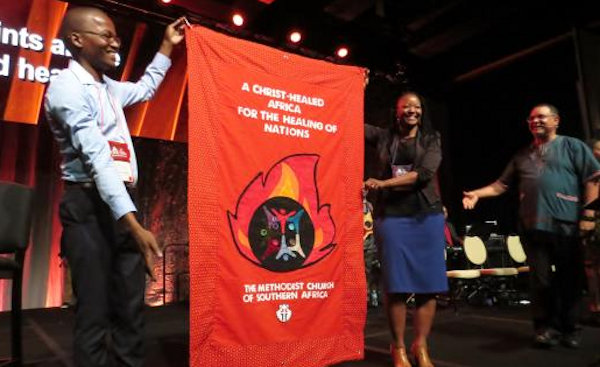The 21st World Methodist Conference brought together some 2,500 faithful, from 108 countries and 88 communions.
SAM HODGES
United Methodist News Service
There’s no better place than a World Methodist Conference to witness the scattered seeds and deep roots of John Wesley’s approach to Christianity.
Some 2,500 Wesleyan faithful, from 108 countries and 88 communions including The United Methodist Church, gathered at a downtown Houston hotel for the 21st such gathering.
“John Wesley said the Methodists are one people throughout the world,” said United Methodist Bishop Scott Jones, who as newly assigned Texas Conference episcopal leader offered greetings at an Aug. 31 opening service. “It’s in this conference, as we gather together from so many different places, that that unity becomes visible.”
The World Methodist Conference is a once-every-five-years meeting of the World Methodist Council, an association of 80 Methodist, Wesleyan and related United and Uniting churches, representing 80.5 million people.
This conference — meeting August 31 through Sept. 3 — was the first to be held in the United States since 1981. The theme was “One: God, Faith, People, Mission.”
United Methodists have had a key planning role, with Sarah Wilke, publisher of The Upper Room, serving as program chair.
“It’s an amazing moment,” she said as addressed the crowd during the opening worship service.
Banners, prayers, music
That service may not have had Olympics-level choreography, but it did have a stirring parade of denominational banners — carried by groups from Nepal, Nigeria and New Zealand, to name a few — as the crowd sang Charles Wesley’s “O For a Thousand Tongues to Sing.”
Greetings were given by Jones, but also by Bishop Vashti Murphy McKenzie of the African Methodist Episcopal Church and Senior Bishop Lawrence Reddick III of the Christian Methodist Episcopal Church, who oversee Texas churches for their denominations.
Prayers came from Bishop Paulo Lockmann, president of the World Methodist Council and a leader of the Methodist Church in Brazil, and from Archbishop Michael Kehinde Stephen, of the Methodist Church Nigeria.
The music, led by Jorge Lockward of the United Methodist Board of Global Ministries, ranged from gospel to South American flutes to traditional church choir numbers, and included the crowd singing “How Great Thou Art” in their own languages.
For the Rev. Emerson Castillo, the opening service alone justified his journey from El Salvador.
“I feel I understand how God can move between all of us even in our diversity and differences and cultural backgrounds,” said Castillo, who works for the Council of Evangelical Methodist Churches of Latin America and the Caribbean and leads a church in El Salvador. “Even though there were many languages represented, the spirit guided us as one church.”
Astrophysics and Psalm 8
The World Methodist Conference, in contrast to The United Methodist Church’s General Conference, is not about legislation, budgets and other forms of church politics.
Instead, it’s an occasion for people of the Methodist tradition to be together.
“This is like a huge family reunion,” said United Methodist Bishop Michael Watson, incoming ecumenical officer and a member of the steering committee of the World Methodist Council.
However, while most family reunions might make do with a blessing before the meal, the World Methodist Conference features daily worship services and teaching in a variety of formats. These include workshops led this time by faculty of United Methodist-affiliated Perkins School of Theology at Southern Methodist University in Dallas.
For the opening worship, a conventional sermon was replaced by a dialogue between astrophysicist Jennifer Wiseman, a member of Deer Park United Methodist Church in Reisterstown, Maryland, and David Wilkinson, a scientist-turned-theologian teaching at St. John’s College, Durham University in England.
They rooted the talk in Psalm 8 (“When I consider thy heavens, the work of thy fingers, the moon and the stars, which thou hast ordained …”) but also projected images of distant galaxies and emphasized how the latest research underscores the vastness of the universe and illuminates its likely Big Bang origin.
“I glean from this that the God we pray to is awesome,” said Wiseman.
Wilkinson argued that Christians should welcome, not feel threatened by, the fast march of science.
“It’s a gift to liberate; it’s a gift to heal; it’s a gift to instill in us awe and wonder,” he said.
Roots and relevance
At worship on Sept. 1, the Rev. Rudy Rasmus, pastor of St. John’s United Methodist Church in Houston, did provide a sermon, though he joked about the time limit.
“Wesley could preach all day,” he said. “I only have 30 minutes.”
Rasmus touched on the segregation of his youth in Houston, the pace of technological change, and the need for the church to love sincerely, energetically and without precondition if it’s going to avoid obsolescence.
He recalled how he came to faith well into adulthood at Houston’s Windsor Village United Methodist Church, thanks to the embrace of its pastor, the Rev. Kirbyjon Caldwell, and the congregation.
“I could care less what the Book of Discipline said in that moment. What I really wanted to know was, ‘Do you love me?’” Rasmus said.
But Rasmus, recalling how the local zoo was more welcoming than white churches in his youth, also challenged the audience to seek justice as it loves.
“Love should be creating a disruption in your part of the world,” he said.
Rasmus’ address brought call-and-response style encouragement from the audience as he preached, and a standing ovation as he concluded.
For the Rev. Reynaldo Leao-Neto, a Brazilian working in inner-city London for the Methodist Church in Britain, the World Methodist Conference needs prophetic preaching and teaching to help ensure the relevance of Wesleyan Christianity.
“It helps us to translate our roots into today’s concerns,” he said.
Last Updated on January 30, 2024

